Archive for the ‘Immigration News’ Category
Monday, September 3rd, 2012
By: Timothy Sutton, Communications Editor
 Today, recruiters, human resource managers, and small business owners utilize the Internet to recruit new employees. Online recruiting is cheap, efficient, and reaches a much broader audience than traditional forms of media. While there are numerous advantages to employing a professional staffing agency to locate prospective employees through the Internet, many employers choose to self-publish want ads through popular websites like monster.com or craiglist.org. Self-publishing online job posting gives the employer complete control over when, where, and how long a post will be visible to the public. Ultimately, do-it-yourself recruiting can be personally tailored to suit a particular employer’s needs.
Today, recruiters, human resource managers, and small business owners utilize the Internet to recruit new employees. Online recruiting is cheap, efficient, and reaches a much broader audience than traditional forms of media. While there are numerous advantages to employing a professional staffing agency to locate prospective employees through the Internet, many employers choose to self-publish want ads through popular websites like monster.com or craiglist.org. Self-publishing online job posting gives the employer complete control over when, where, and how long a post will be visible to the public. Ultimately, do-it-yourself recruiting can be personally tailored to suit a particular employer’s needs.
But recruiters beware. The Internet is much more sophisticated than a virtual corkboard. Keywords and phrases in your job listings can be tracked and monitored by government software, then stored in databases. Recently, the Civil Rights Division of the Office of Special Counsel (OSC) released a Best Practices notice for online job posting. Whether this notice foreshadows future litigation over civil rights violations in hiring practices is yet to be determined; regardless, the message is clear, employers need to exercise caution when recruiting online because the OSC is monitoring online want ads.
Immigration laws prohibit the use of discriminatory language regarding U.S. Citizenship, lawful permanent residence, citizenship status, or national origin unless required by law, regulation or executive order. Curiously, the OSC notice was released shortly after a handful of states attempted to curtail the rights of Deferred Action Childhood Arrival qualifiers to obtain state identification (see our previous post here). There is no data revealing any increase in discriminatory language found in online job postings, but a simple keyword search on either monster.com or craigslist.org reveals numerous non-compliant ads. For instance, if the word “citizen” is entered into Craigslist, ads for dishwashers, personal assistants, security guards, and caregivers pop up. Each ad contains some version of the following discriminatory language that the OSC notice clearly forbids pursuant to the Immigration and Nationality Act at § 1324b that prohibits discrimination based on the citizenship status or national origin in the hiring, firing unfair document practices (“document abuse”) during employment eligibility verification process, and retaliation:
- “Only U.S. Citizens”
- “Citizenship requirement”*
- “Only U.S. Citizens or Green Card Holders”
- “H-1Bs Only”
- “Must have a U.S. Passport”
- “Must have a green card”
One explanation presented by the OSC for the common use of such language is the misinterpretation of federal employment laws. Employers are not limited to the recruitment of U.S. citizens. In fact, we recently published an article on the proper method of verifying the legal employment status of refugee/asylees. Due to the complexity of adhering to the legal requirements of recruiting, hiring, and employing individuals in today’s diverse workplace, employers should seek the professional guidance of an attorney. The cost savings and convenience of self-publishing job postings are heavily outweighed by the potential financial penalties and negative publicity of losing an anti-discrimination lawsuit.
Our office has the experience and successful track record necessary to protect the interests of your enterprise. For more information, contact one of our immigration professionals at info@immigrationcompliancegroup.com or call 562 612.3996.
Tags: Anti-Discrimination, Anti-Discrimination Lawsuits, Civil Rights Violations, Discriminatory Language, Employer Comopliance Training, HR Professionals, I-9 Form, I-9/E-Verify News, Immigraiton News, Immigration Compliance Group, Internet Recruitment, Legal Workforce, OSC, OSC Best Practices for Job Posting, Recruiters, Recruitment Discrimination, Staffing Agencies, Talent Acquisition, Unfair Employment Practices
Posted in DACA | DAPA, Employer Compliance, I-9/E-Verify News, ICE, Immigration News, OSC, Staffing Agencies | Comments Off on RECRUITING: Internet Justice – Respecting Civil Rights in Online Recruiting
Tuesday, August 21st, 2012
By Timothy Sutton, Communications Editor
The California Board of Food and Agriculture met with labor experts from across the country last week in Santa Cruz, to discuss recent labor shortages. In the midst of the worst drought in fifty-six years, crops are being left to rot in fields across the country due to a lack of legally available agriculture workers. Ag-Vision, a progress report complied by the California Department of Food and Agriculture, highlights the devastating impact immigration laws have on the available agricultural labor force in the state:

An estimated 75 percent of California’s agricultural workforce is foreign-born, primarily in Mexico, and about half the workers are believed to be unauthorized under current immigration laws. Reform of those laws is needed to alleviate a shortage of farm labor that is putting stress on the harvest and processing of California’s crops, as well as to offer opportunities to those immigrant families who are responsibly seeking greater opportunity in America. In particular, mandating the use of E-Verify in agriculture could force California farmers to let go many of their employees without any realistic chance of replacing them.
The report also sites a number of state bills that propose immigration alternatives to the “cumbersome” H2-A. The Employment Acceleration Act, AB1236 (Paul Fong, D-Cupertino), prohibits state and local governments in California from forcing private employers to use E-Verify, except where required by federal law. The Agricultural Job Opportunities, Benefits, and Security Act (AgJOBS) introduced by California Sen. Dianne Feinstein (S. 1038) and Rep. Howard Burman (D-28thDistrict, Van Nuys), the bill represents a compromise between farm labor organizations and major agricultural employers. The bill proposes an “earned legalization” program enabling many undocumented farmworkers and H-2A guest workers to earn a “blue card” temporary immigration status with the possibility of becoming permanent residents. H.R. 2895, the Legal Agricultural Workforce Act and AB 1544, the California Agricultural Jobs and Industry Stabilization Program, authorize guest worker programs permitting undocumented aliens to work in the domestic agriculture industry and allows their families to legally reside in the state.
According to Feinstein, at least 84,155 production acres and 22,285 jobs have moved to Mexico. The current lack of available workers is evidence that the system in place, including the H2-A visa, is inadequate. The H2-A visa requires a lengthy approval process from both the Department of Labor (DOL) and United States Customs and Immigration Services (USCIS). Visa holders are eligible to work for a year, renewable for up to a three-year period, but limited to travel outside the country for a maximum of three months. Many of the visa’s requirements are difficult for employers to comply with, including the provision of standard housing, meals, daily transportation, workers compensation, and adherence to the fifty percent rule (maintain at least a 50% US workforce per availability).
Until state legislation is adapted to create a more reliable source of agricultural workers, employers should seek legal assistance to secure lawful seasonal laborers. For more information on how to secure visas, comply with E-Verify, and attract a secure and suitable workforce, contact one of our immigration professionals at info@immigrationcompliancegroup.com or call 562 612.3996.
Tags: AB1236, AB1544, AgJOBS, Blue Card, CA Board of Food and Agriculture, California Agriculture, E-Verify, Farmworkers, Guest Worker Program, H-2A visa, HR2895, Sen. Diane Feinstein, undocumented immigrants
Posted in Agriculture, Comprehensive Immigration Reform, Employer Compliance, Immigration Legislation, Immigration News | Comments Off on Out In Left Field: CA Needs H2-A Ag-Worker Overhaul
Monday, August 20th, 2012
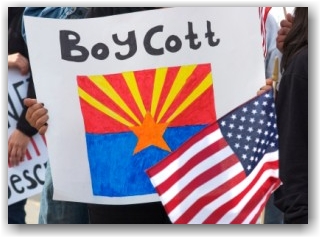
By: Timothy Sutton, Communications Editor
The State of Arizona behind Governor Jan Brewer has made their position clear, they do not support Deferred Action Childhood Arrivals. Brewer signed her own executive order to “defend” Arizona from President Obama’s Deferred Action Program. Executive Order 2012-06 alleges that because DACA workers are not given lawful status, but merely deferred status, DACA recipients can be legally denied the right to obtain a driver’s license or any public benefit.
Brewer justifies her executive order as a defense against DACA which she refers to as “federal paperwork,” that will result in “significant and lasting impacts on the Arizona budget, it’s healthcare system and additional public benefits that Arizona taxpayers fund.” A Brewer spokesperson sited specific public benefits that DACA holders will not be eligible for: KidsCare, a children’s health-insurance program; unemployment benefits; business and professional licenses and government contracts.
Legal challenges to Brewer opposition of Obama’s DACA program are expected this week. Under the REAL ID Act of 2005 Sec.202(C)(B)(2)(viii), a federal law that modified requirements for state driver’s licenses and ID cards, “deferred action” is a term used for those eligible for state issued identification and driver’s licenses. According to NBC News, Regina Jefferies a local Phoenix attorney, criticized Brewer’s executive order saying, “Immigrants in Arizona have in the past been granted “deferred action” for other reasons long before the new Childhood Arrivals program was announced.” Additionally, Brewer’s spokesperson said that DACA students would not receive in-state tuition pricing.
After Brewer’s announcement, protester’s outside of the Arizona state capital waived signs that read, “Why the hate?” This sentiment raises the question, is Brewer guilty of playing politics with immigrant lives? Certainly, extreme curtailing of the DACA program by states like Arizona (and Florida) appears to be less about state preservation than politics. This preemptive strike against the Presidential Executive Order is a sign of the strong resistance to come for future immigration reform that favors inclusion over deportation.
California officials announced they would honor the DACA program and issue driver’s licenses to eligible persons. As temporary California residents, DACA beneficiaries will be afforded in-state tuition pricing, driver’s licenses, and the temporary ability to seek employment.
The national success of the DACA program shall remain closely monitored. We will continue to keep you updated on this and other breaking immigration news. If your business has questions about the DACA program or hiring from this temporary workforce, contact one of our immigration professionals at info@immigrationcompliancegroup.com or call 562 612.3996.
Please check out our news and stay informed.
More articles: AZ Denies Dreamers GED Classes
Driver’s Licenses Vary by State
Tags: Arizona Immigration, AZ Gov. Jan Brewer, Comprehensive Immigraiton Reform, DACA Program, Deferred Action for Childhood Arrivals, Dreamers, illegal immigrants, Immigration Reform, Legal Workforce, President Obama Executive Order, Undocumented Workers
Posted in DACA | DAPA, Employer Compliance, ICE, Immigration Legislation, Immigration News | Comments Off on Brewer v. Obama: AZ Won’t Issue Driver’s License To DACA Workers
Thursday, August 16th, 2012
The Department of Justice Office of Public Affairs recently published a press release pertaining to the employment of two refugees resolving allegations that the company discriminated under the anti-discrimination provision of the Immigration and Nationality Act (INA), when it impermissibly delayed the start date of two refugees after requiring them to provide specific Form I-9 documentation. Best Packing’s violations occurred when they required the refugees to supply the company with additional Form I-9 verification documents in excess of the law. The claim alleged that other non-refugee employees were not required to supply documents other than state issued licenses and social security cards.
In two charges filed with the department, the refugees alleged that they were not allowed to begin employment until they produced unexpired, Department of Homeland Security-issued employment authorization documents, despite the fact that they initially presented sufficient documentation for employment eligibility verification purposes. The charging parties had presented unexpired state identification cards and unrestricted Social Security cards. The state ID’s and unrestricted SS cards were deemed insufficient proof of work authorization.
It is necessary for all those charged with Form I-9 processing at your organization to be very familiar with the list of acceptable documents and to have a thorough understanding of the fact that each employee has the right to present a list A document or a combination B plus C document as long as they are acceptable documents, appear to be genuine and represent the employee that is before you.
Under the settlement agreement, Best Packing agreed to pay $4,379 in back pay and comply with all the requirements of the INA. Understanding the Form I-9 requirements for verifying refugee/asylee(s) will prevent your company from falling victim to similar discriminatory hiring practices.
The process by which an employer is required to verify the employment eligibility of a refugee/asylee(s) when presented with documentation other than the above-referenced List B plus List C combination, can be a bit complicated. Let’s review this.
Asylees and Refugees are individuals seeking the protection of the United States due to persecution suffered in the home country based upon: race, religion, nationality, social group, or political ideology. These individuals are authorized to work in the US because of their immigration status. When presented with documentation of asylum or refugee status, it is advisable to be aware of the following in regard to examining the I-9 form and the documents presented:
SECTION 1:
- The employee should check the “An alien authorized to work” box
- Write the I-94 or Alien Registration Number in the first space
- Write “N/A” in the second space, because their employment authorization does not expire

SECTION 2:
Acceptable Documents are I-94, I-766, or their Employment Authorization Document also known as an EAD card
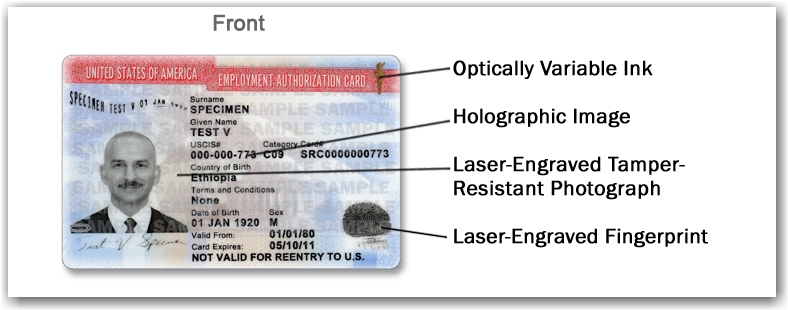
NOTE: this section presents two different scenarios that require strict attention to time restrictions and combinations of required documents to be presented in order to comply with the USCIS regulations. To complete this section choose from the applicable scenarios below:
Scenario One: Refugee presents a Form I-94:
When presented with a Form I-94 containing an unexpired refugee admission stamp, the employer must accept it as a receipt establishing both employment authorization and identity for 90 days. After 90-days, the employee must present either an EAD or a combination of a List B document and List C (an unrestricted social security card.)
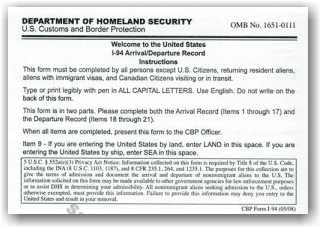

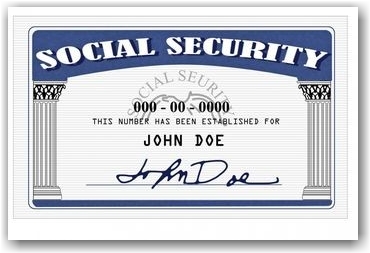
Scenario Two: Asylee presents a Form I-94:
An employer must accept Form I-94 or Form I-94A with one of the stamps or notations below indicating asylee status:
- Asylum granted indefinitely
- 8 CFR 274a.12(a)(5)
- INA 208
This is a List C document that does not require/contain an expiration date. However, the asylee will need to present a List B identity document with this Form I-94.
*Decisions from immigration judges granting asylum are not acceptable.
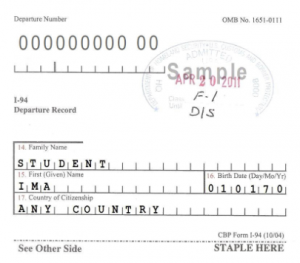

For further assistance on training your company’s hiring personnel on all of the requirements of Form I-9 compliance, contact one of our immigration professionals at info@immigrationcompliancegroup.com or call 562 612.3996.
Tags: Best Packaging I-9 Ruling, DOJ, I-9 Acceptable Documents, I-9 Anti-Discrimination Provision, I-9 Discrimination, I-9 Document Examination, I-9 for Refugees/Asylees, I-9 Over-Documentation, I-9 Training, I-9/E-Verify News, ICE, OSC, Worksite Enforcement
Posted in Employer Compliance, I-9/E-Verify News, ICE, Immigration News, Uncategorized, USCIS | Comments Off on Form I-9 How To Guide: Employing Refugee/Asylee(s)
Tuesday, August 14th, 2012
By: Timothy Sutton, Communications Editor

The biggest names in banking, Goldman Sachs, JP Morgan, Wells Fargo, Bank of America, Lehman Brothers, MF Global, Countrywide, and Chase have been subject to financial misconduct investigations for imprudently squandering hundreds of millions of dollars. Last week the Justice Department made the unfortunate announcement that Goldman Sachs would not be charged for its infamous trades. Yet over the past few years, despite the devastating impact hedging bad debt has done to our economy, virtually no criminal or civil penalties have ensued. Economists and legal analysts have a range of theories attempting to explain how crimes of “greed” go virtually unpunished; one plausible explanation is we are all to blame: investors, bankers, consumers, government and regulators all contribute to the degradation of our banking system. The SEC has become somewhat of a paper tiger launching costly and intricate investigations resulting in piles of reports that ultimately assign no guilt.
Conversely, ICE investigations almost invariably result in hefty civil and even criminal fines. Deportation raids and I-9 audits are typically swift and allow few of the procedural processes that SEC, Department of Treasury, or Department of Labor investigations require. Over the past few years, there have been record numbers in both deportations and employer sanctions issued by ICE and the USCIS. Unlike greed, failure to maintain a lawful workforce endures the cold chill of ICE.
Shockingly, the public reaction to the financial crisis has been fractured and highly politicized. Remember the Tea Party and Occupy movements? Alternatively, punishing companies employing immigrant workers has found a stronghold in national politics. While it is unjustifiable to violate any law of the United States, it is alarming that those who protest against the corruption of financial institutions are considered extremists, but those who protest against hiring immigrants are nationalists? It is possible that the simpler the crime the harsher the time explains this phenomenon. Americans don’t understand how billions of dollars could disappear from the banks they entrusted their life-savings to; but can easily conceptualize how an immigrant workforce may under-cut “American” employment.
As business owners, violating simple duties like Form I-9 compliance and employment verification through E-Verify may result in the most damaging penalties. There are no congressional investigations, lengthy judicial proceedings, or public sentiment to lessen the blow of an ICE audit. In light of our current social political environment it would be a prudent investment to seek the advice of immigration professionals to proactively prepare for an immigration audit. For more information contact one of our immigration professionals at info@immigrationcompliancegroup.com or call 562 612.3996.
Tags: Bank of America, Chase, Countrywide, Curency Hedging, Goldman Sachs, I-9/E-Verify News, ICE, ICE Audits, JP Morgan, Lehman Brothers, MF Global, Mortgage-Backed Securities, Too Big to Fail, Wall Street Firms, Wall Street Meltdown, Wells Fargo
Posted in DOJ, Employer Compliance, I-9/E-Verify News, ICE, Immigration News | Comments Off on Enforcement Seesaw: Financial v. Immigration Violations | Immigration Compliance Group News
Sunday, August 12th, 2012
By: Timothy Sutton, Communications Editor
On August 10, 2012, the 3rd Circuit Court of Appeals ruled in favor of Wal-Mart Stores Inc., facing charges for acts of transporting illegal immigrants, harboring illegal immigrants, encouraging illegal immigration, conspiracy to commit money laundering, and involuntary servitude. Zavala et al. v. Wal-Mart Stores Inc., spanned eight years and four judicial opinions. The allegations against Wal-Mart suggested that senior officials knowingly and willingly permitted contractors and sub-contractor to hire illegal immigrants to perform after-hour janitorial services.
In their defense, Wal-Mart asserted that the plaintiff janitorial workers were not employees (therefore, not under their control), but also performed work at a Marriott hotel, a movie theater, and remodeling homes. Further, Wal–Mart often used store associates (regular, non-contract employees) to clean its stores. As a result, the court found that Wal-Mart did not knowingly hire illegal immigrant workers or encourage their contractors to do so. The court refused to certifying the class action based upon the shared discrete characteristic of plaintiffs as undocumented immigrants, stating: “Being similarly situated does not mean simply sharing a common status, like being an illegal immigrant.”
Moving forward, it is likely that Wal-Mart will amend its screening and compliance policies when hiring contractual workers. Many of the allegations against the big-box retailer reveal suspect employment practices that should be avoided including:
- Management commenting on immigration status of workers
- Using out-of-state relief workers immediately following the arrest of workers by federal immigration authorities
- Allowing workers to store personal belongings in store
- Allowing workers to sleep in store
For more information about the latest immigration court rulings and other breaking immigration news, subscribe to our blog and contact our office to discuss your I-9 audits, training and compliance program needs, 562 612.3996, info@immigrationcompliancegroup.com.
Tags: Employer Compliance I-9/E-Verify, ICE, illegal immigrants, Legal Workforce, Undocumented Workers, Walmart Janitor Contractors, Walmart Janitorial Class Action
Posted in Employer Compliance, I-9/E-Verify News, ICE, Immigration News | Comments Off on Squeaky Clean? Wal-Mart Escapes Janitorial Class Action | Immigration Compliance Group News
Tuesday, August 7th, 2012
By: Timothy Sutton, Communications Editor
 The United States Citizenship and Immigration Services (USCIS) have released a brochure, flyer, information on avoiding scams and hosted a teleconference regarding the launch date of the Deferred Action Childhood Arrivals (DACA) Application effective August 15, 2012. USCIS has provided a wealth of detailed information in various forms to clarify the deferred action application procedures. The popular media format of the flyer will likely be the most effective educational tool used with those eligible for the program. The timeline format and accompanying info-graphics are matched with concise language that aid the reader’s understanding.
The United States Citizenship and Immigration Services (USCIS) have released a brochure, flyer, information on avoiding scams and hosted a teleconference regarding the launch date of the Deferred Action Childhood Arrivals (DACA) Application effective August 15, 2012. USCIS has provided a wealth of detailed information in various forms to clarify the deferred action application procedures. The popular media format of the flyer will likely be the most effective educational tool used with those eligible for the program. The timeline format and accompanying info-graphics are matched with concise language that aid the reader’s understanding.
Below are some highlights of the latest updates to the application procedure shared by USCIS Director Mayorkas on Friday, August 3, 2012:
Requesting Deferred Action
The government filing fees will be $465 in total for the deferred action application, the employment authorization document and the biometrics/background check.
Director Mayorkas stated that the information provided to USCIS on a request for Deferred Action (DAC)A request is protected from disclosure to U.S. Immigration and Customs Enforcement (ICE) and U.S. Customs and Border Protection (CBP) for the purpose of immigration enforcement proceedings unless the requestor meets the criteria set forth in USCIS’s Notice to Appear guidance (
www.uscis.gov/NTA). Individuals whose cases are deferred pursuant to the consideration of deferred action for childhood arrivals process will not be referred to ICE. The information may be shared with national security and law enforcement agencies, including ICE and CBP, for purposes other than removal, including for assistance in the consideration of deferred action for childhood arrivals, to identify or prevent fraudulent claims, for national security purposes, or for the investigation or prosecution of a criminal offense. The above information sharing policy covers family members and guardians, in addition to the requestor.
There is no reapplication or appeals process for a failed application.
Biographic and biometric background checks are required. Immigration crimes are not factored into criminal history.
At this time, extensions of the 2 year deferred action status will be available.
Unlawful presence status is put on hold once deferred action status is granted.
If denied, cases will only be referred to removal proceedings under exceptional circumstances.
Qualifying For Deferred Action
- Individuals must not have current immigration status.
- Individuals detained by USCIS may only request qualification through their detention officer.
What documents will be required? Financial, medical, school, employment, and military records sufficient to show both entry before age of 16, as well as residence for at least five years preceding June 15, 2012. Affidavits alone will generally not be sufficient evidence, but may support a shortcoming in documentation regarding casual departures or continuous residence. USCIS will not accept affidavits in support of meeting the below requirements. You may request consideration of deferred action for childhood arrivals if you:
- Were under the age of 31 as of June 15, 2012;
- Came to the United States before reaching your 16th birthday;
- Have continuously resided in the United States since June 15, 2007, up to the present time;
- Were physically present in the United States on June 15, 2012, and at the time of making your request for consideration of deferred action with USCIS;
- Entered without inspection before June 15, 2012, or your lawful immigration status expired as of June 15, 2012;
- Are currently in school, have graduated or obtained a certificate of completion from high school, have obtained a general education development (GED) certificate, or are an honorably discharged veteran of the Coast Guard or Armed Forces of the United States; and
- Have not been convicted of a felony, significant misdemeanor, three or more other misdemeanors, and do not otherwise pose a threat to national security or public safety. Driving under the influence is considered a significant misdemeanor.
- Note: *Circumstantial evidence will not be considered for age on June 15, 2012 or school/veteran status.
- Travel prior to August 15, 2012 must be brief, casual, and innocent in nature.
- If false or misrepresented information appears on the application, unlawful status is upgraded to enforcement priority, subject to immediate criminal prosecution and removal.
- There is no expedited processing for deferred action.
- Employment authorization requires demonstration of “an economic necessity for employment.”
- Relatives are not covered under deferred action unless they independently qualify
- TRAVEL: Question – If my case is deferred pursuant to the consideration of deferred action for childhood arrivals process, will I be able to travel outside of the United States? Not automatically. If USCIS has decided to defer action in your case and you want to travel outside the United States, you must apply for advance parole by filing a Form I-131, Application for Travel Document and paying the applicable fee ($360). USCIS will determine whether your purpose for international travel is justifiable based on the circumstances you describe in your request. Generally, USCIS will only grant advance parole if you are traveling for humanitarian purposes, educational purposes, or employment purposes. You may not apply for advance parole unless and until USCIS defers action in your case pursuant to the consideration of deferred action for childhood arrivals process. You cannot apply for advance parole at the same time as you submit your request for consideration of deferred action for childhood arrivals. All advance parole requests will be considered on a case-by-case basis.
Subscribe to our blog for breaking news and updates on deferred action and other immigration laws. We are starting to work with clients on documentation gathering. Should you have questions or wish to engage the services of our office, please contact us at 562 612.3996 or email us at: info@immigrationcompliancegroup.com
Resources: The USCIS “How do I Guide” – USCIS FAQs
Tags: Deferred Action Childhood Arrivals, Deferred Action Effective date 08/15/2012, EAD Card, Employment Authorization, Immigration Detention, Immigration Reform, Legal Workforce, Prosecutorial Discretion, Removal Proceedings, USCIS, Voluntary Departure
Posted in Comprehensive Immigration Reform, DACA | DAPA, Immigration Legislation, Immigration News, USCIS | Comments Off on “D.A. Day” 08/15/12: Deferred Action Ready For Launch | Update from Immigration Compliance Group
Friday, August 3rd, 2012
 By: Timothy Sutton, Communications Editor
By: Timothy Sutton, Communications Editor
Shortly after ICE began their Form I-9 audit of the San Antonio based sushi chain, Sushi Zushi, an exodus of employees forced the company into a weeklong-statewide shutdown. After an internal announcement by Sushi Zushi management to employees of the routine audit, a wave of scared employees did not return to their jobs on Friday Morning. A public statement was issued by Sushi Zushi’s public relations spokesperson; Judy McCarter detailing the company’s decision:
STATEMENT FROM SUSHI ZUSHI, Friday, July 27, 2012
Sushi Zushi has temporarily suspended its operations and closed its restaurants in San Antonio, Austin and the DFW Metroplex. We plan to resume operations as soon as possible.
The decision to close the restaurants was made at Sushi Zushi today by executive management due to an unanticipated internal reaction to news of a routine I-9 audit. Several vital employees have chosen not to report to work. This has affected our ability to provide our expected level of service to guests. CEO Alfonso Tomita is returning from travels outside the country.
Sushi Zushi’s policy is to comply with all federal, state and local laws and regulations. And Sushi Zushi has made its best efforts to comply with I-9 requirements always done appropriate due diligence on all its staff. Sushi Zushi is working with legal counsel to respond to the government’s audit.
We wish to be clear – there was no raid by the government on our operations. Nor has any employee been detained by the government or terminated by the company. Sushi Zushi is responding to a routine I-9 audit. We apologize in advance for the inconvenience and appreciate the patience of our loyal guests while we work through this issue.
Company management immediately posted want ad’s on Craigslist and Facebook. Their customers posted their concerns across social media, including accusations of mismanagement that surfaced on reddit.com. In the midst of this audit meltdown, an employee announced via facebook that he was promoted from delivery driver to sushi chef. With the company’s reputation spinning out of control, their facebook page had posts of former kitchen employees who remarked, “The food won’t be the same without us,” while other employees joked with friends that they had a week-off work to “fill out their I-9 forms.”
Before ICE issues a dollar of fines or fees, Sushi Zushi will suffer hundreds of thousands in loses and devastating harm to their reputation. Sushi Zushi employees fled because they were not educated on the differences between an I-9 audit and deportation raids. Clearly, today’s ICE audits are shaping up to be equally as effective in deterring unlawful employment as raids of the past. To prevent your company from becoming the next Sushi Zushi, contact our immigration professionals for their expert knowledge on Form I-9 compliance, and sign up to receive our information and visit our Employer Resource Center: www.I-9Audits.com
Tags: I-9 AUDIT, I-9 Fines, I-9 management, I-9 Training, I-9/E-Verify News, ICE Audit, Legal Workforce, Sushi Zushi Audit, Undocumented Workers, Worksite Enforcement
Posted in I-9/E-Verify News, ICE, Immigration News, USCIS | Comments Off on Form I-9 Audit Prompts Sushi Zushi Closure – Fish on ICE
Sunday, July 29th, 2012
 By: Timothy Sutton, ICG Communications Editor
By: Timothy Sutton, ICG Communications Editor
High unemployment across the country may be contributing to the shift in focus by numerous State and Federal agencies toward eradicating the underground economy. This term is used in the insurance industry to refer to unlicensed, untaxed, and uninsured employers or contractors. In immigration circles, the illegal workforce is the common term used to represent undocumented workers who like workers in the underground economy, represent the unlawful economic advantage unscrupulous employers have over law-abiding businesses. In response to these illegal employment practices, the government is on a crusade to incentivize the legal employment of American workers.
This July, California’s Department of Insurance spearheaded a multi-agency task force similar to undertakings of ICE, DHS, OSC, and SEC. Detectives from the California Department of Insurance (CDI), the Contractors State License Board (CSLB), Employment Development Department (EDD), and County District Attorneys’ offices effectively created their own “Avengers” partnership to make an 11 county sweep across California, resulting in 104 enforcement actions.
US businesses are not strangers to regulatory enforcement. Arguably, complicated regulations on tax, insurance, employment and immigration laws deter the success of small to mid-sized American companies trying to expand into today’s global marketplace. Large corporations avail themselves of depressed wages and lenient international labor regulations by outsourcing labor to under-developed nations. Government regulatory and enforcement agencies like ICE have no jurisdiction to punish large corporations that exploit workers overseas. Consequently, “Avengers,” like the California task force against the underground economy, mostly impact local and domestic companies, often to their demise.
Competing against global-economic influences on a long-term basis in any industry requires strict scrutiny of company hiring policies, employment practices, and compliance with a complex myriad of tax, insurance, and immigration laws. If your business employs a domestic workforce, large or small, contact us to learn more about workforce compliance and subscribe to our blog for the latest immigration news and updates.
Tags: CA Insurance Commissioner Dave Jones, California Department of Insurance, California State Immigration, California Unemployment, Comprehensive Immigration Reform, I-9/E-Verify News, Illegal Workforce, Immigration Reform, Statewide Joint Enforcement Strike Force Operation, Underground Economy, Undocumented Workers, US Immigration Policy
Posted in Comprehensive Immigration Reform, I-9/E-Verify News, Immigration Legislation, Immigration News | Comments Off on California’s “Underground Economy” Avengers | Immigration Compliance Group NEWS
Saturday, July 21st, 2012
By: Timothy Sutton, Communications Editor
Swiss based Nestle has discovered “numerous” violations of its internal work rules as a result of internal auditing aimed at combatting child labor. The manufacturer of Kit-Kat bars reported that four-fifths of its cocoa comes from unmonitored labor channels. The Fair Labor Association is insisting Nestle implement higher supply chain standards moving forward. The cocoa industry is fraught with child labor issues, with child worker rates reaching upwards of 89% in the Ivory Coast. Unfortunately this far-reaching problem will not be solved overnight, “The complexity of child labor in the cocoa supply chain means solving the problem will take years,” Nestle said.
As a result of Nestle’s voluntary audit, the company has avoided penalties thus far. However, their involvement in child labor comes at a price. The company is now committed to altering supply chain practices and will invest heavily in future monitoring services.
While most American businesses can rest assured they are not supporting the underground child-labor industry, Nestle’s efforts to self-assess and reform should be applauded. Domestic and international companies will benefit greatly from routine internal audits that track workforce compliance. USCIS and ICE encourage employers to frequently perform internal audits of their Form I-9 practices. In fact, records of regular auditing of your workforce may help you avoid hefty civil penalties in the event of an official government audit. The next time you “break off a piece of that Kit-Kat bar,” consider following Nestle’s example of self-auditing and contact one of our immigration professionals at info@immigrationcompliancegroup.com or call 562 612.3996.
Other resources:
Tags: Child Labor Laws, E-Verify, Fair Labor Association, I-9 Audits, I-9 Compliance, I-9 Training, I-9/E-Verify News, Legal Workforce, Nestle, Voluntary Audits, Worksite Enforcement
Posted in Department Of Homeland Security (DHS), I-9/E-Verify News, ICE, Immigration News | Comments Off on Nestle KID-Kat Bars?: Audit Helps Chocolate Maker “Grow Up”
 Today, recruiters, human resource managers, and small business owners utilize the Internet to recruit new employees. Online recruiting is cheap, efficient, and reaches a much broader audience than traditional forms of media. While there are numerous advantages to employing a professional staffing agency to locate prospective employees through the Internet, many employers choose to self-publish want ads through popular websites like monster.com or craiglist.org. Self-publishing online job posting gives the employer complete control over when, where, and how long a post will be visible to the public. Ultimately, do-it-yourself recruiting can be personally tailored to suit a particular employer’s needs.
Today, recruiters, human resource managers, and small business owners utilize the Internet to recruit new employees. Online recruiting is cheap, efficient, and reaches a much broader audience than traditional forms of media. While there are numerous advantages to employing a professional staffing agency to locate prospective employees through the Internet, many employers choose to self-publish want ads through popular websites like monster.com or craiglist.org. Self-publishing online job posting gives the employer complete control over when, where, and how long a post will be visible to the public. Ultimately, do-it-yourself recruiting can be personally tailored to suit a particular employer’s needs.











